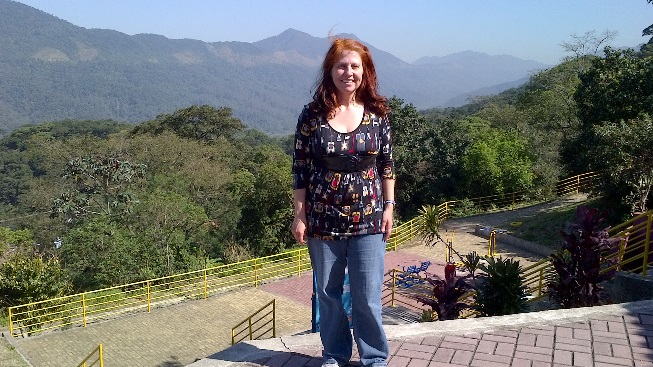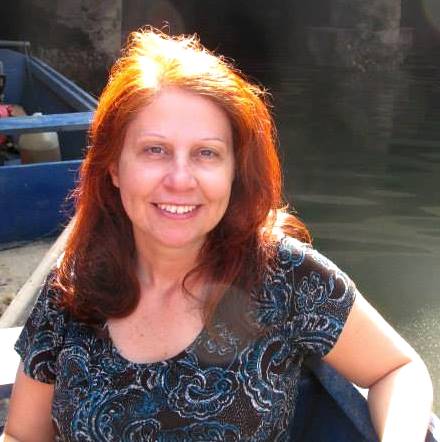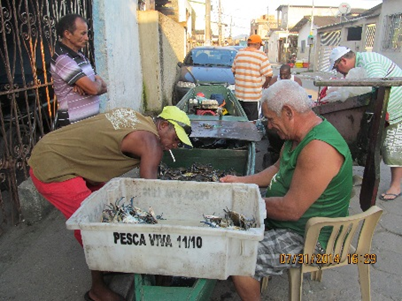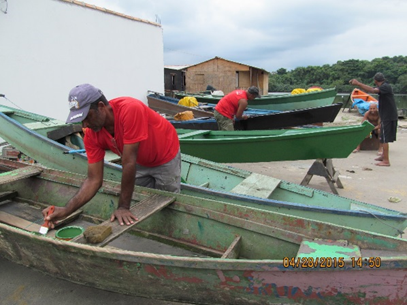
10 Apr Cintia Gillam – Vila dos Pescadores, Brazil
“In the Spotlight” is a series of interviews that takes a closer look at the work of CCRN students and their research. Read more to learn about our students’ research and the communities they work with.

Cintia is currently a PhD candidate in Applied Science at Saint Mary’s University, Canada, under the supervision of CCRN director Tony Charles.
“The social injustices towards northeastern migrants living in slums always bothered me”, says CCRN graduate student Cintia Gillam. As a child, Cintia could not fully understand why crab gatherers would live in shacks located in the mangrove areas. Through her master’s degree, supervised by CCRN director Tony Charles, Cintia realized that the power imbalances between the Brazilian elites and oppressed groups, were the reasons behind the social injustices she observed as a child. Her thesis tackled the role of power and inequality in a well being context, with emphasis on an environmental and natural resource perspective. Through the CCRN network, Cintia gained valuable knowledge and insights useful to understanding her community.
Continue reading to learn more about Cintia’s thesis “Effects of Social and Environmental Inequalities on the Wellbeing of a Slum Community: The case of Vila dos Pescadores in Southeast Brazil,” and the insights Cintia gained while completing her master’s degree. The interview is also available in audio format, click play on the recording below to listen to Cintia’s Interview.
Click play to listen to Cintia’s Student Research in Community Conservation
What excites you about the work you did for your thesis?

Community leader Vadinho, fishers and Cintia at the dock
On a personal level, working with these amazing people who are living in impoverished areas gives me a sense of justice. I was born and raised in São Paulo city, part of a middle-class family of European descent. Many migrants from Northeastern Brazil who live in mangrove slums are Afro-Brazilians; they were and still do suffer racial and economic discrimination, doing the jobs the elites don’t want to do, and this always bothered me, this tremendous injustice. Indeed, slum dwellers are marginalized groups and in the case of the Vila dos Pescadores, many of them are unemployed and make a living as fishers and crab gatherers.
While being a master’s student in International Development Studies at Saint Mary’s University, I learned international development theory, developed my critical thinking skills, and learned to articulate my own thoughts and ideas about important global issues. This learning was complimented and enhanced by this field experience outside the classroom. It was rewarding for me to see other Brazilian governmental and non-governmental organizations working with Vila dos Pescadores after I graduated.
Did you run into any difficulties during your studies? If so, how did you address them?
Upon arriving in Cubatão, my study site, I intended to interview people from Cubatão’s industrial hub. I contacted several industry representatives, but only Petrobras (Brazilian company specialized in energy industry, oil and natural gas) and Unipar Carboclo (Brazilian chemical company) allowed me to meet industry representatives.

Scarlet Ibis – Eudocimus ruber
At the beginning of my research I also found it difficult to meet with local fishers. When I arrived in Cubatão, the president of the Community Association of Vila dos Pescadores, Jose Arnaldo dos Santos (Vadinho) introduced me to fishers in their dock area. However, at times it was difficult to meet fishers either because they were fishing, or they were in their house. I felt that there was a general lack of trust in researchers, which made it difficult to interview fishers and community members at the beginning of my research. In addition, when I first traveled to meet with this community, I didn’t have a lot of background in social sciences. However, I quickly learned how to observe peoples’ behavior and adapt accordingly in terms of how to interview them and build relationships.
How does your research affect the community you worked with?
While in the community, I connected the community leader Vadinho with a researcher from the Fisheries Institute. They still work together to help change policies focusing on small-scale fisheries.

Vila dos Pescadores’ dock during low tide
What do you think are the next steps for learning more about the topics you addressed in your thesis?
Because the Brazilian elites and the media often consider slums as places of violence and criminality, I found my research helped to show that slums are a place like any other, and local institutions are welcomed to work with the community leader to improve conservation and livelihoods in the community of Vila dos Pescadores and beyond. More importantly, fishers and community members are proud to be part of the mangrove reforestation projects. They helped reintroduce mangrove reforestation projects which involve children, fishers and other members of the community. When implementing conservation projects it is necessary to include a multitude of actors, including the private sector, which can support fishers and community members. The analysis of community and fishers’ wellbeing is important at a policy level to allow interventions such as selective urbanization and the involvement of fishers in conservation initiatives.

Fishers selling blue crabs, Callinectes sapidus
How does your research contribute to your field?
My research is unique because it tackled environmental racism, wellbeing and relational wellbeing in a slum mangrove community. In addition, this research can potentially help improve partnerships between the public and private sectors with community leaders in slums.

Community leader Vadinho and fishers painting boats – funds donated by the Robin Rigby Trust
Browse Cintia Gillam’s publications to learn more about her work in coastal communities
Gillam, C. (2016). Effects of social and environmental inequalities on the wellbeing of a slum community: The case of Vila dos Pescadores in Southeast Brazil. Master’s Thesis International Development Studies Program, Saint Mary’s University, Halifax, Nova Scotia, Canada.
Gillam, C. and Charles, A. (2016). A wellbeing analysis of fishers in a Brazilian coastal shantytown. 4th International Marine Conservation Congress (IMCC), St John’s, Newfoundland and Labrador, July 3– August 3, 2016.
Gillam, C. (2016). Class differences and racism – social, ethnic and economic inequalities leading to poverty: A case study of mixed-race Northeastern migrant populations living in the city of Cubatão, São Paulo State, Southeast Brazil. The Lusophone World in Progression: Historical Legacy, Transnationalism & Development in Globalized Contexts, Halifax, June 28 – July 1, 2015.
Gillam, C. (2016). Vila Dos Pescadores, Cubatão, State of São Paulo, Brazil: Improving livelihoods and promoting dialogue in Vila dos Pescadores, Cubatão, state of São Paulo, Brazil. Community Conservation Research Network, Halifax, Nova Scotia.
Gillam, C. (2015). Impact of Environmental Degradation on Fishers’ Livelihoods – The Case Study of a Brazilian Mangrove Community, Vila dos Pescadores. The Robin Rigby Trust.


